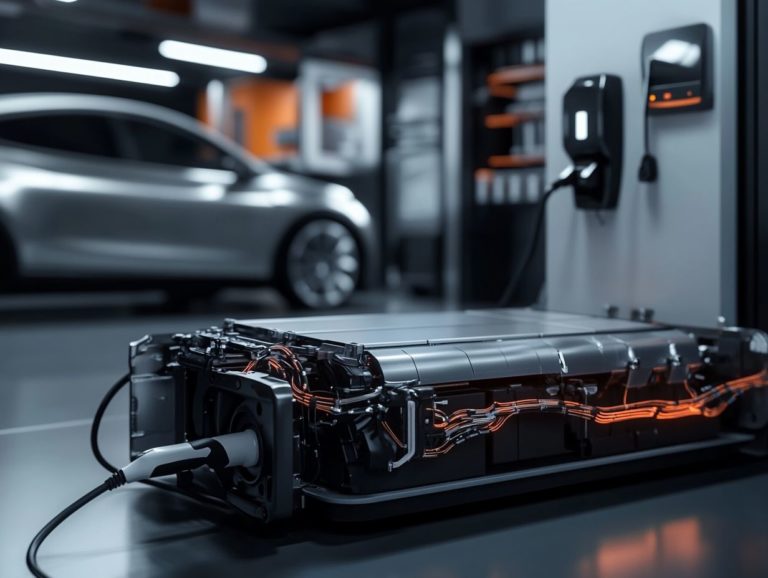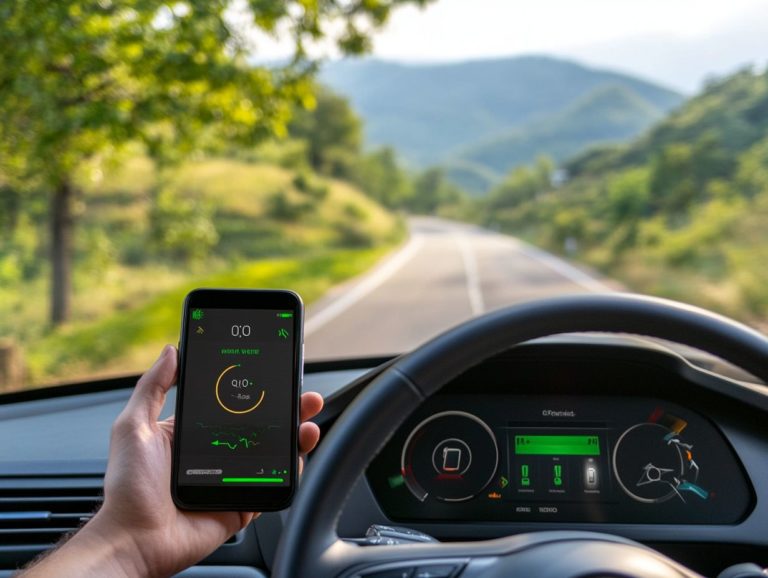How to Handle EV Battery Replacement
Electric vehicles (EVs) are revolutionizing transportation, but they also introduce unique challenges particularly concerning battery performance.
Understanding when your EV battery needs replacement is vital for maintaining efficiency.
This guide covers common signs indicating a battery swap is necessary, factors to consider such as cost and environmental impact and insights on choosing and installing a new battery.
It also includes tips for extending the life of your new battery, ensuring you maximize every mile of your electric journey.
Whether you re an EV enthusiast or just starting, this guide will empower you with the knowledge to keep your vehicle operating at its best.
Contents
Key Takeaways:
- Understand the importance of replacing your EV battery and its impact on performance.
- Watch for signs that suggest your EV battery needs replacement, like decreased range and frequent charging.
- Consider cost, warranty, and environmental impact when choosing a replacement battery.
Why You Should Replace Your EV Battery
The need for EV battery replacement arises from factors like performance issues, voltage drops, and safety concerns for electric vehicle owners, especially if you drive a Nissan LEAF. Understanding EV battery lifespan and care is crucial, as lithium-ion batteries, the type used in most EVs, have a finite lifespan, making it essential to recognize when replacement is necessary to maintain optimal performance.
Automakers continually innovate to address these challenges, often using advanced tools that monitor battery health. For electric vehicle owners, paying attention to battery health can lead to more dependable performance.
Regularly checking for reduced range, unusually long charging times, or warning lights on the dashboard are key indicators that may signal the need for early action.
Practices like maintaining optimal charging habits and avoiding extreme temperatures can significantly extend your battery’s life. Proactively monitoring battery health can lead to a more rewarding ownership experience and potentially lower long-term costs.
Signs that Your EV Battery Needs to be Replaced
Recognizing the signs that your EV battery might need replacement is essential for maintaining your electric vehicle’s reliability and efficiency. Key indicators include a decline in charging efficiency, noticeable drops in performance, and increased temperatures while charging.
The Nissan LEAF and other electric vehicles often exhibit these symptoms. When you notice them, it s wise to use diagnostic tools for timely service and effective energy management.
Common Warning Signs
Common warning signs indicating your EV battery needs replacement include persistent warning lights, reduced driving range, and excessive heat during charging. These indicators are vital for drivers, especially if you own a Nissan LEAF or Ford Mustang Mach-E. Recognizing these signs early can save you from unexpected downtimes and extend the life of your electric vehicle.
If the battery warning light is a constant presence on your dashboard, it usually points to issues like battery cell degradation or faulty connections. A significant drop in driving range, where your EV struggles to reach its usual mileage, may signal diminished battery capacity due to age or environmental factors.
You might also notice a temperature surge while charging, which could indicate the battery is overheating. This condition, if not addressed, may lead to premature failure. In such cases, consult a professional for diagnostic testing to identify the root cause.
Follow-up actions might include recalibrating the battery management system or even replacing the battery entirely to restore optimal performance.
Regularly checking your battery health is crucial. Stay informed to ensure your electric vehicle operates at its best!
Factors to Consider Before Replacing Your EV Battery
Before you replace your EV battery, there are several crucial factors you need to consider. Start with the replacement cost, as this will significantly impact your budget. Additionally, understanding how to handle EV maintenance records can help you make informed decisions.
Next, explore the warranty options offered by automakers. A solid warranty can provide peace of mind.
Don t overlook the environmental impact of battery disposal; this is an essential aspect that can greatly influence your overall ownership experience.
By understanding these elements, you can ensure that your replacement choice not only meets your performance expectations but also aligns with sustainable practices in vehicle maintenance.
Cost, Warranty, and Environmental Impact
The cost of replacing an EV battery can vary significantly depending on the make and model you own, such as the Nissan LEAF or a Tesla.
Often, this process comes with warranty options that shield you from potential battery defects or premature failure.
Think carefully about how your battery impacts the environment; it s a big deal! The environmental implications of battery disposal and recycling are crucial to consider. Ensure that your replacement process aligns with sustainable practices within the electric vehicle market.
As a consumer, be mindful of the potential price range, which can stretch from a few thousand dollars to over ten thousand, based on the specific battery technology and features.
Warranty options can also vary greatly among manufacturers; some may offer extensive coverage for years, while others provide limited protection. Grasping these financial aspects is essential for you as an EV owner. A well-structured warranty can help ease concerns over unexpected expenses.
Proper battery disposal is very important. Both manufacturers and consumers share a responsibility to ensure that lithium-ion batteries are recycled responsibly, reducing environmental harm and promoting resource recovery through sustainable methods.
Choosing the Right Replacement Battery
Selecting the ideal replacement battery for your electric vehicle is essential to guarantee compatibility and achieve optimal performance. You’ll find a variety of options tailored to specific models like the Nissan LEAF or the Ford Mustang Mach-E, each differing in energy capacity and quality.
It’s important to explore various battery types, including lithium-ion and other emerging technologies, to determine the best match for your unique electric vehicle requirements.
Types of Batteries and Compatibility
You’re faced with a range of replacement batteries for electric vehicles, with lithium-ion being the star player in models like the Nissan LEAF. Each battery type comes with its own compatibility and performance specifications that significantly influence energy efficiency.
Understanding these nuances is key for you as a driver, especially if you’re looking to maximize your vehicle’s capabilities and ensure a smooth replacement process.
Take, for example, models that use nickel-metal hydride batteries. While they may offer certain advantages in specific driving conditions, they often can’t match the range provided by lithium-ion options.
Performance can vary widely based on energy capacity; a higher-capacity battery allows for longer drives between charges, while a lower-capacity option could restrict your travel distance.
It’s crucial to heed the recommendations from automakers or consult with professionals when selecting the most appropriate battery for your specific model and driving needs. This thoughtful approach not only guarantees optimal performance but also extends the lifespan of your vehicle.
How to Properly Replace Your EV Battery
Replacing your EV battery the right way involves a meticulous, step-by-step process designed to maximize safety and performance. It all starts with diagnostics to identify the appropriate replacement, followed by how to handle EV repairs effectively to secure the new battery properly.
By familiarizing yourself with these steps, you not only enhance your vehicle’s longevity but also gain confidence in the entire replacement process.
Step-by-Step Guide
A step-by-step guide to replacing your EV battery involves several crucial actions: assessing the current battery state, selecting the right replacement, and ensuring a safe installation. This process is essential for maintaining the performance of your vehicle, whether it’s a Nissan LEAF or a Ford Mustang Mach-E. Additionally, knowing how to handle EV maintenance emergencies and familiarizing yourself with safety protocols is vital to avoid complications during the replacement.
- Start with a thorough diagnostic of your existing battery to identify issues, such as diminished range or unexpected warning lights.
- After this assessment, selecting a compatible replacement becomes vital. Consider key factors like capacity and warranty to make an informed choice.
Before diving into the installation, gather the appropriate tools wrenches, insulated gloves, and safety goggles. These will protect you from electrical hazards throughout the process. It’s a good idea to consult or hire professionals experienced in EV maintenance. They can ensure accurate installation while upholding safety standards and optimizing your vehicle’s performance.
Taking this careful approach mitigates risks and guarantees that your vehicle operates efficiently, keeping you confident and in control.
Maintaining Your New EV Battery
Maintaining your new EV battery is crucial for optimizing its performance and extending its lifespan. Essential tips include:
- Use proper charging techniques.
- Monitor temperature levels.
- Understand how the battery wears over time.
By prioritizing these maintenance strategies, you can enhance the reliability of your electric vehicle while minimizing long-term costs.
Tips for Prolonging Battery Life
To extend the life of your EV battery, adopt effective maintenance strategies! Focus on optimal charging habits, avoid extreme temperatures, and regularly monitor your battery’s performance.
Charge your vehicle within the 20% to 80% range to minimize stress on the battery and keep it healthy. Don t forget to regularly check for software updates from manufacturers, as these can optimize your vehicle’s performance and efficiency.
During hot weather, park in shaded areas, and when temperatures drop, keeping your vehicle indoors can make a big difference.
By being mindful of these practices, you not only safeguard your investment but also contribute to a more sustainable future, enhancing both battery health and vehicle performance for the long haul.
Frequently Asked Questions
What is an EV battery and why would I need to replace it?
An EV battery is the main power source for an electric vehicle. It stores energy that powers the vehicle’s electric motor. Over time, the battery may lose its ability to hold a charge, leading to a decrease in driving range and ultimately requiring replacement.
How often do EV batteries need to be replaced?
The lifespan of an EV battery can vary depending on factors such as usage, climate, and maintenance. On average, most EV batteries are designed to last 8-10 years or around 100,000-150,000 miles before needing replacement.
How can I tell if my EV battery needs to be replaced?
If you notice a significant decrease in your vehicle’s driving range or if it takes longer to charge the battery, it may be a sign that your EV battery needs replacing. Also, pay attention to any warning lights or messages on your vehicle’s dashboard.
Can I replace my EV battery myself?
Replacing an EV battery is complex and potentially dangerous. It’s best to have a trained professional handle the replacement to ensure it is done safely and correctly. For a smooth transition, consider learning how to prepare for EV ownership transition. Attempting to replace the battery yourself could void any warranties on the vehicle.
How much does it cost to replace an EV battery?
The cost of an EV battery replacement can vary greatly depending on the make and model of your vehicle and the type of battery it requires. On average, it can cost anywhere from $5,000 to $15,000. Research and compare prices from different dealerships or service centers before making a decision.
Summary: Following the outlined steps for replacing and maintaining your EV battery can significantly enhance its performance, reliability, and lifespan. If you encounter any issues, learn how to handle EV maintenance disputes. Don’t wait—schedule a battery check today!
Is there any way to extend the lifespan of my EV battery?
Yes, you can extend the life of your EV battery. Avoid frequent fast charging and keep the battery within a moderate temperature range.
Use a quality charging station and don t let the battery fully drain. Follow these tips and maximize your battery’s lifespan!






